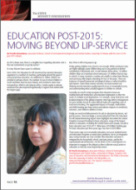
Since 2000, the Education for All movement has spurred education expansion in a number of countries, particularly around the goal of universal primary education. An additional 52 million children are enrolled in primary school. The number of out-of school children in South and West Asia has been halved, and enrolment ratios have increased by a third in sub-Saharan Africa. Gender parity in primary enrolment has also improved significantly in regions that started with the largest gaps.
But, there is still a long way to go.
Firstly, getting children into school is not enough. While enrolment rates are higher globally, many children drop out or are pushed out before completing a full primary cycle. In sub-Saharan Africa alone, 10 million children drop out of primary school every year. Of children that do stay in school, in many countries a number are unable to attain basic literacy and numeracy skills despite attending for four or five years. There are instances of sexual harassment and physical abuse, in what should be safe havens. Given these serious concerns, we must reorient our thinking around education quality beyond access to meaningful access, and understanding what actually happens to children in schools.
Secondly, we need to truly recognise that education issues are multifaceted and interlocked, and education deprivation is often the result of multiple social deprivations. For example, rising food prices and localised impacts of the global economic crisis have direct consequences for poor families forced to make difficult trade-offs regarding costs of food and schooling. The aggravated impacts of hunger, malnutrition, and child stunting also have serious and adverse impacts on enrolment, retention, and children’s abilities to learn.
Finally, we need real disbursements for aid to education by donors, not just lip-service. Disconcertingly, a recent policy brief from the Education for All Global Monitoring Report Team highlights that while the United Kingdom increased funding for basic education, many of the largest donors in education, including the United States and Canada, cut aid to basic education over 2010-2011. What was a $16 billion funding gap for basic education just three years ago, has risen to $26 billion.
These issues urge us to reconsider education, not as an isolated sector, and education inequities as stand-alone problems, but in an integrative way. Going forward, we must consider that education exclusion is mitigated by the household, school, and state arenas, and by the supranational aid architecture. On the brink of 2015 and beyond, it is important to engage in the debate to direct collective social action in education so that we move beyond lip-service.
This post originally appeared as an article in a special issue on education post-2015 in ENGAGE Magazine of the Steve Sinnott Foundation, Issue 8. Download the full issue here.
 RSS Feed
RSS Feed